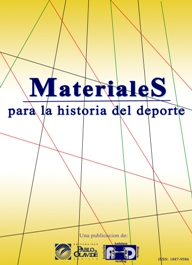The amateur rugby in England in s. XIX: philosophy or social manipulation?
Keywords:
professionalism, Greece, sport, sociology, history.Abstract
The August 27, 1995, Vernon Pugh, chairman of the committee of the International Rugby Board (IRB) for amateurism, said the Rugby happened to be a free sport. It thus ended more than a century of declared amateurism in this sport, and also ended a decade of discussions on shamateurism or concealed professionalism, in which the players were not paid to play but by work, whether real or fictitious, which gives the defending club. In that year, ended the anachronism of a late twentieth century sport governed by rules of Victorian England. How did he get to this situation? Dunning and Sheard argue that the phenomenon of amateurism in rugby in the nineteenth century was a complex instrument of social differentiation and must be analyzed from a historical standpoint and sociopolitical. In this line, Bádenas states that the British aristocracy in S. XIX used the growing interest in ancient Greek culture to assign values to the sport practiced at that time so that was conceptualized as a recreational activity characteristic of a social elite. To achieve this, extolled the values of a Greek amateur sports (which did not exist as such a concept) and enhanced those texts criticizing the professionalization of sports and its impact on sport. British theorists, as Mahaffy attributed to the ancient Greek sport values that matched the prototype athlete gentlemen of the Victorian era.
Downloads
References
Bádenas, P. “El espíritu olímpico: mito moderno y realidad antigua” en In corpore sano, editado por F. García y B. Hernández. Madrid: UAM Ediciones, 2005
Baker, W.T. “William Webb Ellis and the origins of Rugby Football: The life and death of a Victorian myth”. Albion: A Quarterly Journal Concerned with British Studies. 13 (1981):117-130
Blackledge, P. “Rationalist capitalist concerns: William Cail and the Great Rugby Split of 1895”. The international journal of the history of sport, 18 (2001): 35-53
Bowen, J. “Education, ideology and the Ruling Class: Hellenism and english
public schools in the nineteenth century” en Rediscovering Hellenism editado por G.W. Clarke, Cambridge: Cambridge University Press, 1989
Chatziefstathiou, D. & Henry, I. “Hellenism and Olympism: Pierre de Coubertin and the Greek Challenge to the Early Olympic Movement”. Sport in History, 27 (2007): 24-43
Collins, T. “Amateurism and the rise of Managerialism: The case of Rugby Union, 1871-1995”. Sport in History, 30 (2010): 104-120
Curry, G., Dunning, E. & Sheard, K. “Sociological versus empiricist history: Some comments on Tony Collins’s ‘History, theory and the ‘‘civilizing process’’”. Sport in History, 26 (2006):110-123
Diem, R.D. Historia cultural del deporte. Barcelona: Bellaterra, 1984
Dunning, E.G. “Football in its early stages”. History Today, 13 (1963): 838-847
Dunning, E. & Sheard, K. Barabarians, gentlemen and players. Oxford: Martin Robertson, 1979
Gardner, P. New chapters in Greek history. London: John Murray, 1892
Gardiner, E.N. Greek athletic sports and festivals. London: McMillan, 1910
Gruneau, R. “‘Amateurism’ as a sociological problem: Some reflections inspired by Eric Dunning”. Sport in Society: Cultures, Commerce, Media, Politics, 9 (2006): 559-582
Hynes, S. The Edwardian turn of mind. NJ: Princeton University Press, 1968
Holt, R. Sport and the British. Oxford: Oxford University Press, 1989
Holt, R. “The amateur body and the middle-class man: Work, Health and Style in Victorian Britain”. Sport in History, 26 (2006): 352-369
Jenkyns, R. The Victorians and Ancient Greece. Cambridge: MA, 1980
Jolly, W. Education: Its principles and practice as developed by George Combe. Londres: McMillan, 1879
Koulouri, C. “Athleticism and antiquity: symbols and revivals in nineteenth-century Greece”. The international journal of the history of sport, 15 (1998): 142-149
Kühn, C.G. Galeni Opera Omnia, Leipzig: Teubner, 1821-1833
Le Floc´hmoan, J. La génesis de los deportes. Barcelona: Labor, 1965
Leoussi, A.S. “Nationalism and racial Hellenism in nineteenth-century England and France”. Ethnic and racial studies, 20 (1997): 42-67
Mahaffy, J.P. The silver age of the greek world. Chicago: Chicago University Press, 1906
Mewaldt, J. Galeni in Hippocratis de natura hominis commentaria tria, Leipzig: Teubner, 1914
Renson, R. “Fair play: Its origins and meanings in sport and society”. Kinesiology, 41 (2009): 5-18
Riordan, J. “Amateurism, sport and the left: Amateurism for all versus amateur elitism”. Sport in History, 26 (2006): 468-483
Rivero, A. Deporte y modernización. Madrid: Dirección General de Deportes, 2003
Solá, J. “Historia del Rugby”. Apunts, 29, (1992): 6-11
Vamplew, W. Pay up and play the game: Professional sport in Britain, 1875–1914. Cambridge: Cambridge University Press, 1988
Wallace, J. Shelley and Greece: Rethinking romantic Hellenism. Nueva York: St. Martin`s Press, 1997
Williams, P. “Battle lines on three fronts: The RFU and the lost war against professionalism”. The international journal of the history of sport, 19, (2002): 114-136
Whitney, C.W. Sporting Pilgrimage. Nueva York: Harper & Brother, 1894
Young, D. “Mens sana in corpore sano? Body and mind in Ancient Greece”. The international journal of the history of sport, 22 (2005): 22-41
Downloads
Published
Issue
Section
License
Authors who submit to this journal agree to the following terms:
- Author(s) keep copyright and guarantee to the journal the right to be the first publication of the work as licensed under Creative Commons Attribution-Noncommercial-ShareAlike 4.0 International as initial publication in this journal.
- Author(s) can establish additional agreements for non-exclusive distribution of the version of the work published in the journal (for example, to an institutional archives or to publish it in a book), with an acknowledgment of its initial publication in this journal.
- It is allowed and authors are encouraged to disseminate their work electronically (e.g, in institutional open archives or on their own website) before and during the submission process, as it can lead to productive exchanges, as well as a citation earlier and more of published work (See the Effect of Open Access).












